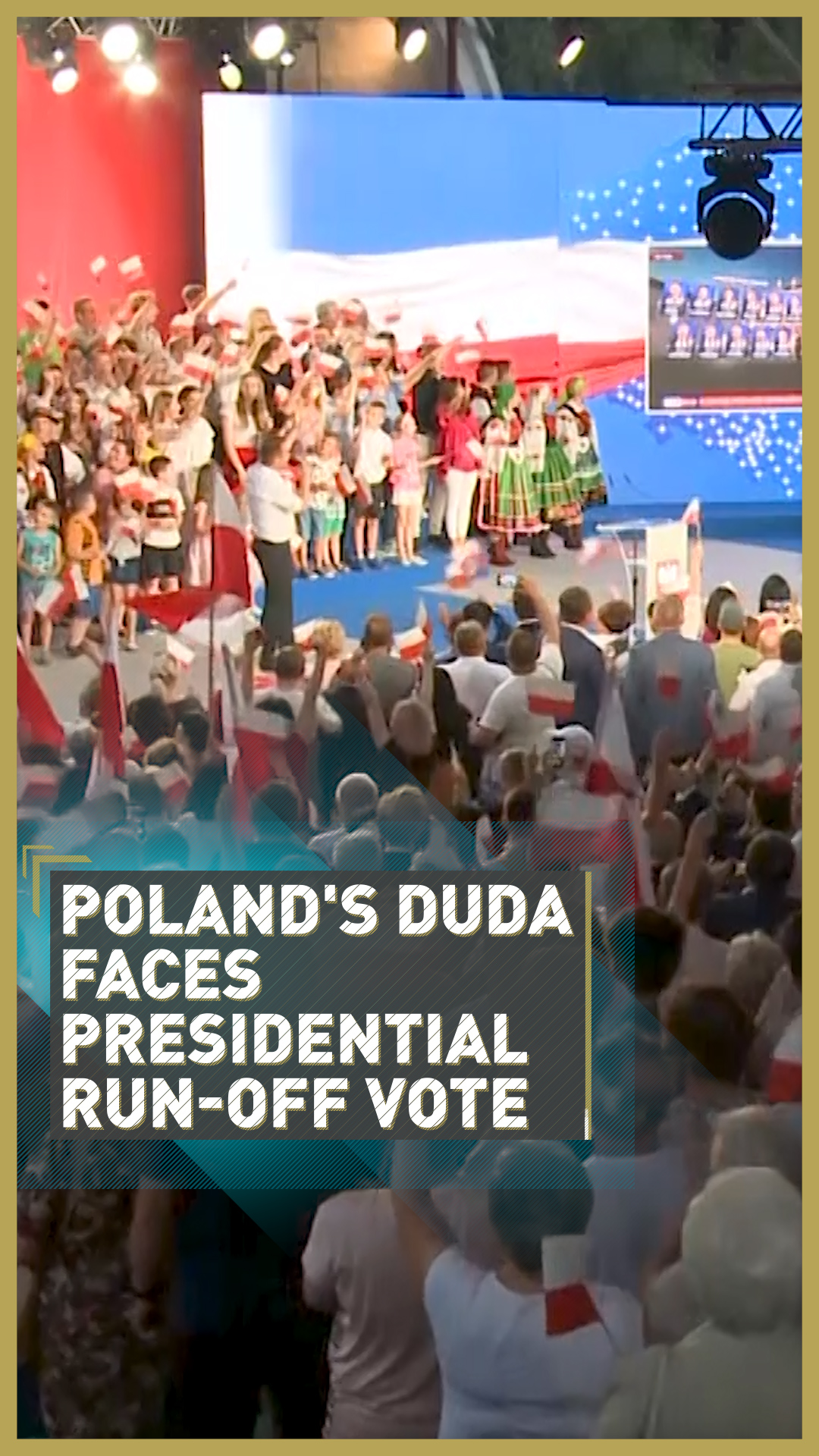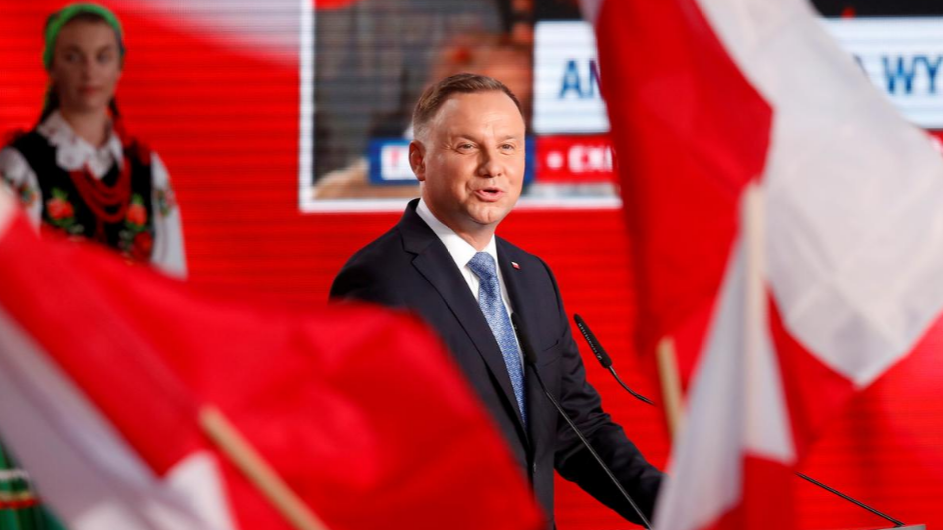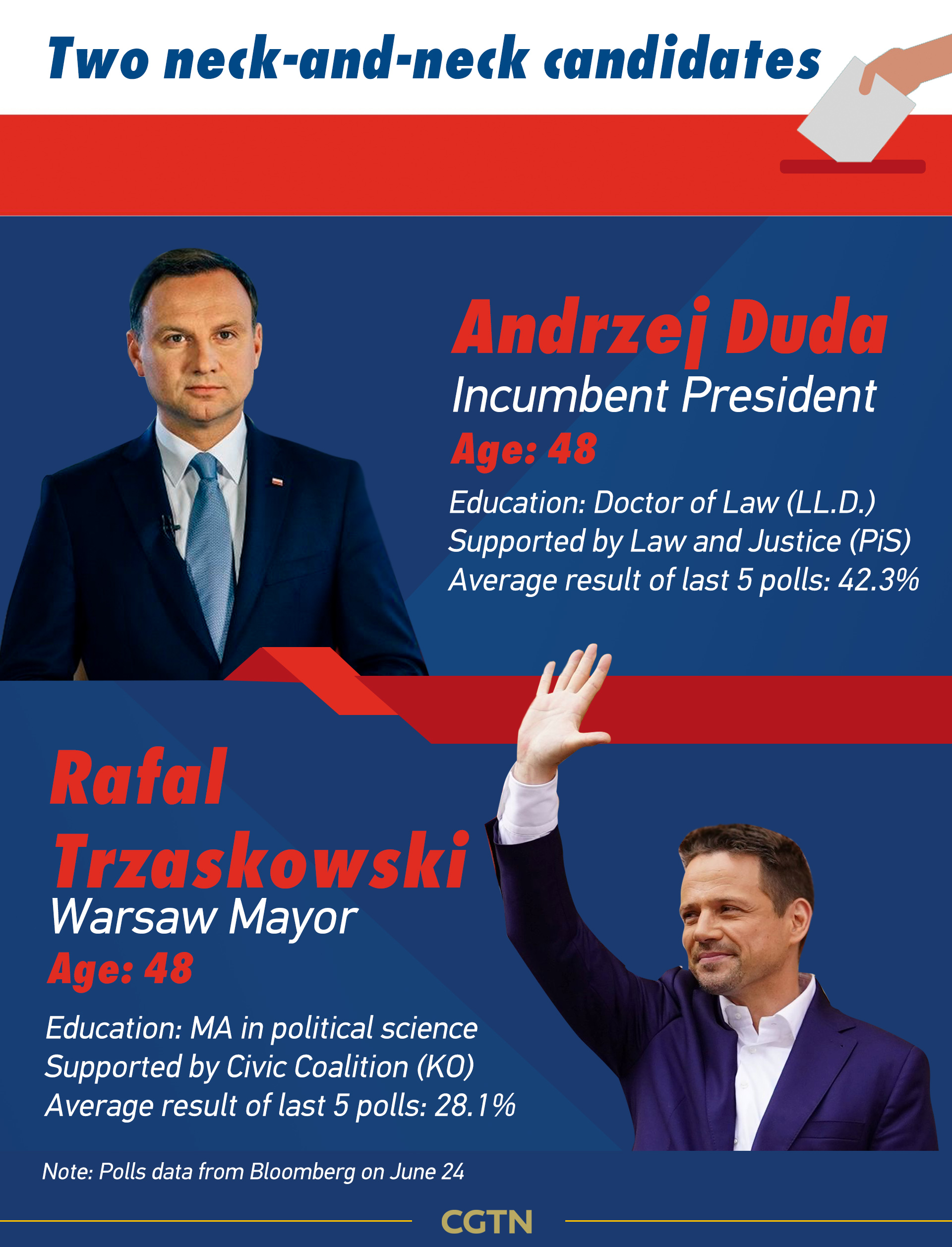02:37

Poland's nationalist incumbent president Andrzej Duda won the first round of a presidential election on Sunday but will have to face the centrist mayor of Warsaw in a run-off on July 12, in a race that could transform the nation's ties with the European Union (EU).
The re-election of government ally Duda is crucial if the ruling nationalist Law and Justice (PiS) party is to implement further its socially conservative agenda, including judiciary reforms the EU says contravene democratic standards.

Polish President and presidential candidate of the Law and Justice (PiS) party Andrzej Duda speaks after the announcement of the first exit poll results on the first round of presidential elections in Lowicz, Poland, June 28, 2020. /Reuters
Polish President and presidential candidate of the Law and Justice (PiS) party Andrzej Duda speaks after the announcement of the first exit poll results on the first round of presidential elections in Lowicz, Poland, June 28, 2020. /Reuters
An exit poll showed Duda winning 41.8 percent of ballots on Sunday, against 30.4 percent for Rafal Trzaskowski from the Civic Platform party. Final results could differ slightly but any changes are not expected to affect who will compete in the second round.
Read more:
Poland's elections: What you need to know
Two opinion polls conducted late on Sunday for private broadcaster TVN and the state-run TVP showed Duda having a lead of less than 2 percentage points over Trzaskowski in two weeks.
PiS has cast Duda as the guardian of its generous welfare programmes, which have helped it win national elections in 2015 and 2019, and of its pledge to protect traditional family values in predominantly Catholic Poland.

CGTN's Isobel Ewing explains what you need to know about the Polish presidency, and what a Duda win - or Trzaskowski upset - would mean for the country.
How important is the position of president?
Although the president's role as head of state is largely ceremonial, he can block laws from being passed in Parliament.
That's important in Poland because incumbent president Andrzej Duda is allied with the ruling Law and Justice Party (PiS) of which he used to be a member, and has thrown his support behind its agenda. This includes controversial reforms to the judiciary, which critics say allows the government to influence the top courts and other key judicial bodies.
Duda's defeat in the presidential election could see the ruling party's influence unravel and possibly trigger early elections.
Who is in pole position for the second round?
The closeness of the latest poll result indicates neither candidate is a shoe-in.
Incumbent Andrzej Duda has plenty of support among Polish who support his deeply conservative social agenda. Many see him as a consistent leader and he and PiS are credited with introducing welfare programs that lifted many Poles out of poverty, such as a monthly €111 wage for each child under 18 regardless of the family income.
However, there's a groundswell of opposition to what many Poles believe is a shift towards authoritarianism in the country, with Duda and PiS accused of eroding democratic rights. This has meant mayor of Warsaw, Rafal Trzaskowski on his campaign of change and an "open Poland" rose fast in the polls and narrowed the race.
Commentators say this election result is a critical turning point for Poland - either continuing down the populist, nationalist and anti Brussels path, or towards a more liberal, pro-European future.
What does the result mean for relations with Brussels?
A victory for the liberal candidate Rafal Trzaskowski would be significant for Brussels because he's pledged to heal rifts between Poland and the bloc.
Andrzej Duda's allies in the ruling party PiS have frequently clashed with the EU over controversial reforms to the judiciary and media.
Under PiS, Poland has - often with the help of Hungarian Prime Minister Viktor Orban - obstructed the bloc's attempts at progress, such as reforming migrant policy and becoming carbon neutral.
As president has the power of veto, which parliament can override only with a three-fifths majority, Trzaskowski if elected could moderate the legislature and cabinet and lead Warsaw to a more harmonious future relationship with Brussels.
Delayed Election
A devout believer himself, Duda had campaigned on a promise to ban classes about gay rights in schools, saying LGBT "ideology" was worse than communist doctrine.
"The campaign goes on because Poland needs it," Duda told jubilant supporters in the central town of Lowicz. "Some people have a complex and think we are not Europeans. We are, and have been... since we converted to Christianity."
But his long-held lead crumbled in the weeks ahead of the election, after a late entry by Trzaskowski, who appears to have galvanized many voters keen to end Poland's isolation within the EU or angry over Duda's allegiance to PiS.
The Polish presidential race was originally planned for May 10. The elections were ultimately postponed due to the COVID-19 pandemic and the resulting lockdown.
00:34

Fragile majority
The Civic Platform, a party, once led by former EU Council President Donald Tusk, replaced its flagging candidate with Trzaskowski after the election was postponed amid the coronavirus pandemic by seven weeks.
A former EU emissary for his party, Trzaskowski has promised to work towards repairing relations with Poland's European allies, and to oppose any government efforts to tighten already restrictive abortion rules.
The election is being closely watched in Brussels.
Read more:
Who will emerge as the victor in Poland's presidential election?
Under PiS, Poland became the only EU state to refuse to commit to the bloc's 2050 climate goal in December 2019, which critics said could undermine its ambition to take on the leading role in the global fight with climate change.
If he wins the election in July, Trzaskowski will have limited scope to direct policy, but will be able to veto legislation proposed by the government.
This could give him a chance to block efforts by the government of prime minister Mateusz Morawiecki to deepen court reforms, which the EU has said politicize the judiciary, or refuse appointments of new judges.
"We will soon decide whether we will have a strong president who will hold the government to account or a president who doesn't respect his own signature," Trzaskowski said during an election-night rally in Warsaw.
(With input from Reuters, Xinhua)